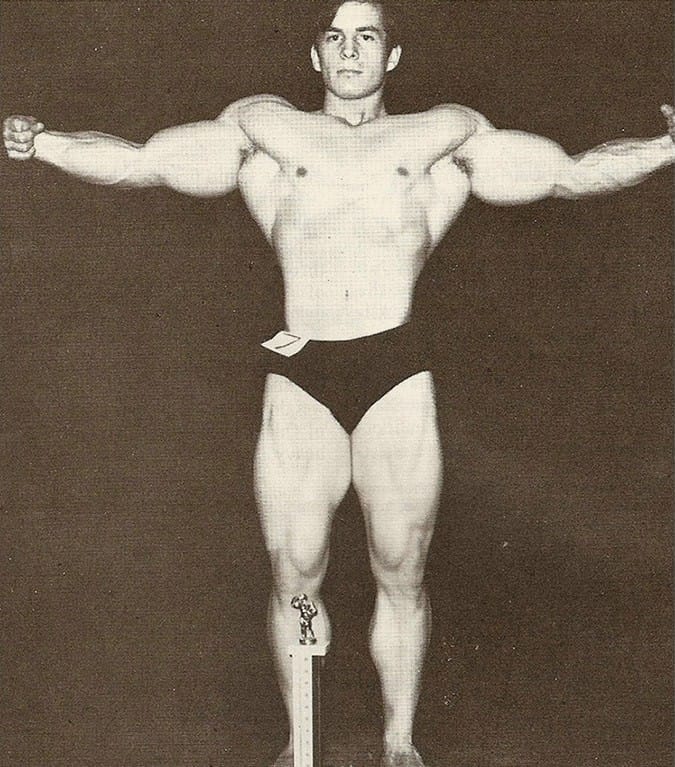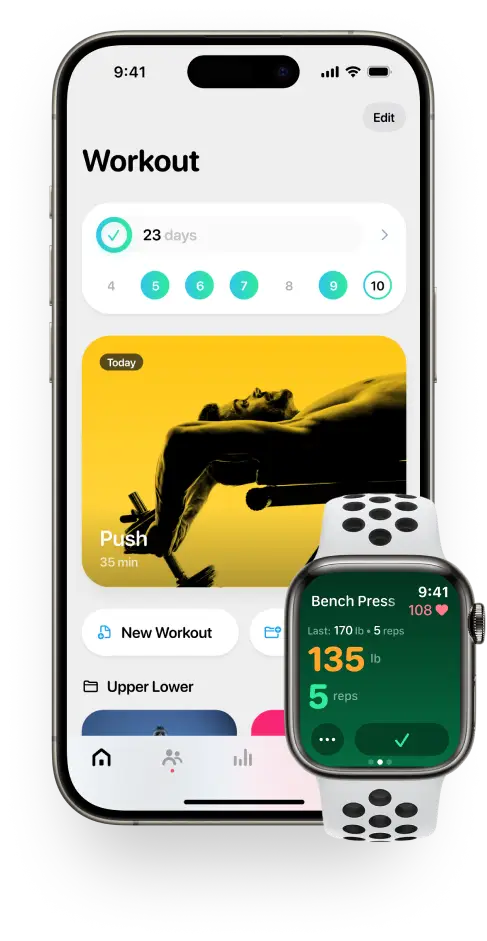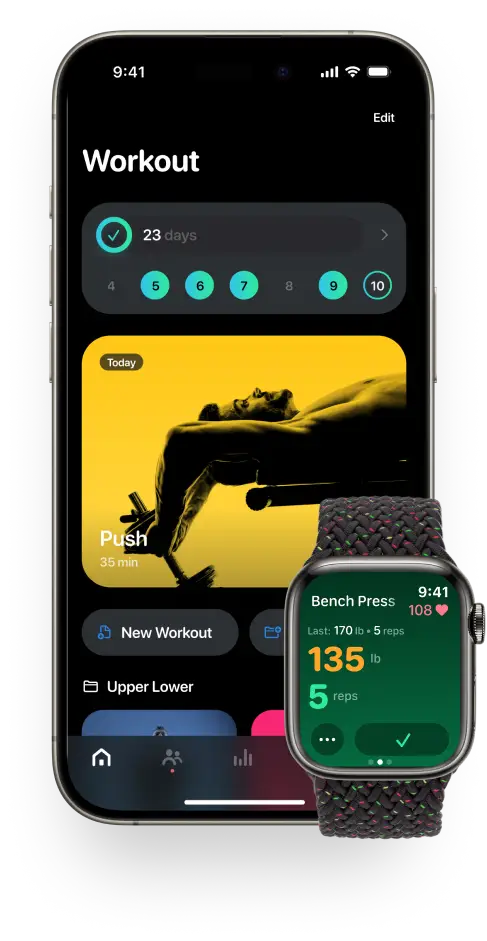Mike Mentzer Heavy Duty: Grow Bodybuilder Muscles
Are you a slacker who likes to spend the least amount of time possible in the gym?
Well, you’ll want to buckle in for this one, then! This workout plan, inspired by Golden Age bodybuilding legend Mike Mentzer is a way to increase your gains quickly and efficiently. In fact, this workout takes barely any gym time at all.
It may sound too good to be true, but the Mike Mentzer Heavy Duty workout plan has you in the gym between one and three days a week. Compare this to something like the bro split workout— five days in, two out, and it seems like a more effective way to use your time.
Is it too good to be true? Here, we’ll break down the Mike Mentzer Heavy Duty workout plan and see the optimal number of gym days per week.
Find out more about what set and rep ranges this bodybuilding superstar used to hone his impressive physique. Plus, learn the pros and cons of Mentzer’s method and see how to adapt it for your own use.
Who is Mike Mentzer?
First off, who is the man himself?
Mike Mentzer (1951-2001) was an IFBB competitive bodybuilder from Philadelphia, Pennsylvania.
He won Mr. America in 1976, and Mr. Universe in 1978. He was also the first and only bodybuilder to achieve a perfect 300 score at the Olympia.
Despite his unique training style, which clearly got him some insane results, Mentzer was a huge believer that genetics play a key role in physique and muscle development.

Good genes aside, though, he had to work hard to get in the shape that he did. This next section will explain what the Mike Mentzer Heavy Duty program is all about and walk through some of its fundamentals.
What is Mike Mentzer Heavy Duty?
This is Mike Mentzer’s training program, considered to be one of the most effective ways to grow muscle. It’s a high-intensity training program based on fewer sets, higher weights, and longer rest breaks.
The idea is that your body can only take so much before it needs to recover. By shifting the emphasis to longer rest breaks, Mentzer theorized that your body would be able to grow more muscle during off-training time.
Mike Mentzer Heavy Duty: Fundamentals
Here’s how Mentzer achieved his competition-ready workouts.
Intensity> Volume
Mike Mentzer’s program emphasizes using more intense workouts rather than a ton of training volume.
Basically, you want to be doing reps that count rather than a ton of reps!

Mentzer came up with at least two iterations of the Mike Mentzer Heavy Duty program. The first, which he developed early in his career called for about 1-2 sets of 6-8 reps per exercise.
Later, though, around the mid-1990s, he came up with Heavy Duty II. In this training program, you would only work through a single set of each exercise to failure in a workout!
Super Slow Reps
One unique component of the Mike Mentzer Heavy Duty workout is the lift cadence that you’re meant to use on each rep.
The workout follows a specific pattern: 4-2-4. So as you lift up (the concentric phase of your exercise), take 4 seconds, hold for 2 seconds at the top of your rep (static phase), and lower on a 4 count (eccentric phase).
Using this slowed rep pace gives you more time under tension. This forces your muscles to work harder, optimizing their growth.
Low Set Range
Mentzer was known for occasionally working on only a single set of a given exercise in his workouts.
Some versions of the Mike Mentzer Heavy Duty workout recommend only two sets per muscle group each week for gym beginners.
Progressive Overload
As you progress, it’s important that your weights do so with you.

Progression of volume load or weight load over time causes your muscles to adapt to the greater effort. Although this workout program doesn’t focus on getting more training volume in terms of sets and reps (in fact, it discourages it), you should be adding more load each time you train an exercise to continue to give your muscles stimulus to grow.
Infrequent Training
The reason why Heavy Duty appeals to so many is that you get to take many days off!
In his books, Heavy Duty, and High-Intensity Training the Mike Mentzer Way, Mentzer documents a few different workout splits that he did over the years during his bodybuilding career.
One of them is a simple push-pull-legs 3-day workout split.
Initially, Mentzer would train his triceps, shoulders, and chest on day one, his back, chest, and trapezius muscles on day two, and legs on day three.
Later, though, he changed this split into chest and back, legs and core, and finally arm and shoulder day.
You’ll notice that with both these split variations, Mentzer only trained three days a week maximum. Why did Mentzer advocate for such infrequent training?
His program is meant to maximize recovery.
One of the most extreme versions of the heavy-duty workout only has you doing one day of exercise with 1-2 sets for a muscle group per week with six days off.
Train to Failure
One thing that Mentzer emphasized was failing on his sets.
Although he would sometimes train only a single set of a given exercise, that set had to count for a lot! Mentzer popularized a style of training called the one set to failure technique.
This means to perform a given exercise for a set that lasts up until you can no longer perform another rep. In other words, you “fail” on the last rep of your set. In fitness terms, we would call this the “RM” or repetition maximum, meaning the maximum number of repetitions you can perform on a specific exercise before failure.
Mike Mentzer Heavy Duty— Weekly Workout
Here, we’ll do an adapted variation on a Mike Mentzer Heavy Duty workout that is more suitable for people who want a balanced gym schedule.
You’re probably not lifting as heavy as Mike and for the sake of habit bubilding, this program follows a three-day split, since it’s generally convenient.
Day 1: Chest and Back
- Warm-up: 5-10 minutes of light cardio and dynamic stretches.
Chest
- Incline Dumbbell Press - 1 set to failure (6-10 reps)
- Flat Dumbbell Flyes - 1 set to failure (6-10 reps)
Back
- Close-Grip Pull-Downs - 1 set to failure (6-10 reps)
- Bent-Over Barbell Rows - 1 set to failure (6-10 reps)
- Deadlift - 1 set to failure (4-6 reps)
Day 2: Rest
You can use this day for active recovery, a light stretch, or a complete rest.
Day 3: Legs
- Warm-up: 5-10 minutes on the treadmill, stationary bike, or elliptical at a low-key pace.
Quadriceps
- Leg Extension - 1 set to failure (8-10 reps)
- Leg Press or Squats - 1 set to failure (6-10 reps)
Hamstrings
- Lying Leg Curls - 1 set to failure (6-10 reps)
Calves
- Standing Calf Raises - 1 set to failure (10-12 reps)
Day 4: Rest
Take this day to fully rest, allowing your muscles to recover from their intense Day 3 leg workout.
Day 5: Shoulders and Arms
- Warm-up: 5-10 minutes of light cardio. Try to focus on your upper body mobility here.
Shoulders
- Seated Overhead Dumbbell Press - 1 set to failure (6-10 reps)
- Lateral Raises - 1 set to failure (6-10 reps)
Biceps
- Standing Barbell Curl - 1 set to failure (6-10 reps)
Triceps
- Tricep Pushdown (cable) - 1 set to failure (6-10 reps)
Days 6 and 7: Rest
Congratulations, you get to take both days off! It may feel counterintuitive, but Mentzer was adamant about allowing for full muscle recovery, emphasizing a good rest between sessions.
Pro-Tips
- Intensity: Make sure you’re doing each exercise with your maximum effort. You should be striving toward muscular failure where you can't complete another rep with proper form.
- Rest Periods: Between exercises, take a 2-3 minute break to fully recover and get ready for the next set.
- Form and Tempo: Keep your form strict and try to use a slower tempo in the (4-2-4) pattern. This approach gives you greater muscle tension and reduces your injury risk.
- Progressive Overload: Aim to increase your weight whenever you can so you keep progressing.
So now you’ve got a Mike Mentzer Heavy Duty-inspired plan to let you absorb full muscle recovery while you reap the benefits of high-intensity training to grow your muscles.
For a little more context, let’s take a look at some of the most frequently asked questions about Mike Mentzer’s Heavy Duty workout routine.
FAQ
Is Mike Mentzer Heavy Duty safe?
Many natural lifters wonder if the heavy duty program is safe for those who don’t choose to use performance-enhancing drugs.
Training with maximum intensity all the time can cause central and peripheral fatigue during resistance exercise to your nervous system. Central nervous system (CNS) fatigue can cause symptoms like brain fog, lack of energy, and poor sleep or appetite. Over time, this can cause you to burn out mentally and physically in the gym, leaving you too lazy to workout.
How many reps does Mike Mentzer use?
Mike Mentzer worked with a low rep range at incredibly high weights. Although this did vary throughout his career, anything from around 4-10 reps could be used if you want to follow his rep guidelines.
Remember, try to use a heavy weight and train to failure. As a rule of thumb, if you’re not failing at 10 reps (or well before), you may not be lifting heavy enough for a Mentzer-inspired plan.
What was Mike Mentzer’s diet?
Although this guy was genetically gifted, he had to do some work on his diet as well to ensure that he was in optimal competition shape.
Unlike a lot of bodybuilders who believe in more protein, and less carbs, Mentzer was a strong advocate for the importance of carbohydrates and their ability to give you workout fuel!
The general consensus was that Mentzer ate 2 servings of protein along with 4 servings of carbohydrates per day.
Did Mike Mentzer use steroids?
Was Mike Mentzer natty?
That would be a no.
Like most famous bodybuilders of the time, Mentzer did take testosterone with the assistance of a doctor before competitions. In his off-season, he didn’t use performance-enhancing drugs consistently, as far as we know.
Unlike others in the competitive bodybuilding world, Mentzer was open about his use of steroids.
How often did Mike Mentzer work out?
Mentzer would typically take several back-to-back rest days per week. At some points during his career, he only trained about once every 5-7 days!
Mike Mentzer Heavy Duty Takeaways
To sum things up, heavy weight + low volume + longer rest breaks = results!
The Mentzer Heavy Duty plan focuses on these along with a few other key components to give you a weekly workout split that you can do if you don’t like to be in the gym a lot.
The key takeaways from this technique are:
- Intensity> volume
- Super slow reps
- Low set range
- Progressive overload
- Infrequent training
- Train to failure
These techniques are slightly different than what you’re probably used to. If you’re struggling to see progress or want to try the Mentzer program to see if it’s right for you, recording the sets and reps you’re using with the Flex Fitness app can help you get mentally accustomed to training with less volume.
And above all things make sure to take advantage of the ample rest! Recovering optimally will help ensure not only your physical fitness but your mental well-being as well.
Related articles


Get fit with Flex
Build muscle & lose weight fast for free.
Available on iPhone + Apple Watch





